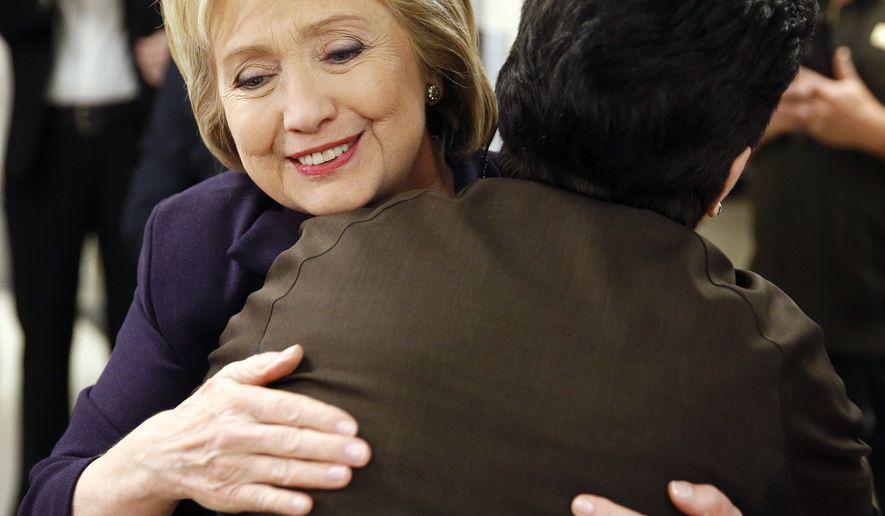In Nye County, one of Nevada’s most rural outposts, sits the Spring Mountain Motorsports Ranch, a sprawling racetrack and private playground for the uberrich.
“That 1 percent — the one that Bernie [Sanders] always talks about — it’s so obvious here, the difference between the rich and the poor,” said Cliff Arnold, chairman of the Nye County Democratic Party. “We have the second-largest car-racing track in the country, but it’s a private one. The megarich — from all over the world — fly in and out and park their luxury cars on the track to race for a few days. But locals can’t get in. It’s rubbed right in your face.”
That’s exactly the sort of anxiety that the senator from Vermont has tapped into in his insurgent bid to win the Democratic presidential nomination, connecting with voters in a way former Secretary of State Hillary Clinton has struggled to do.
Although the nation is experiencing 4.9 percent unemployment, Nye County’s is much higher, at 7.8 percent.
In 2011 the region experienced a devastating blow to its economy when the federal government — at the behest of Democratic Sen. Harry Reid, the state’s senior patron in Washington — nixed the Yucca Mountain nuclear waste repository, which was to serve as the national storage facility for spent nuclear fuel.
The Government Accountability Office concluded the closure was for political, not technical or safety, reasons, leaving voters ever more suspicious of the decisions made by party elites in Washington.
“Jobs are real critical out here, and after the Yucca Mountain project, a lot of jobs were lost, and many of those people are now favoring Bernie,” said Mr. Arnold. “They’re skeptical about the Democratic Party, and what that means for them in their everyday lives. Harry Reid and the party establishment, they think, [have] failed them.”
Challenging the establishment has helped Mr. Sanders into a virtual tie with Mrs. Clinton in the latest CNN/ORC polling in Nevada, which holds its Democratic caucuses this weekend.
Although most Democratic strategists say Mrs. Clinton will be the eventual nominee, outlasting Mr. Sanders, they also say she needs to improve her connection with voters. That means sidelining detailed plans and finding a genuine authenticity.
“The most important thing she needs to do is forge an emotional connection with voters. Bernie has done that with his authenticity and explaining to voters what’s going on in their lives, like he’s their advocate,” said Mark Mellman, a Democratic pollster and president of The Mellman Group. “Hillary’s more focused on the policy positions. She needs to lessen her emphasis on that and find a way to forge an emotional connection with the voters.”
Campaigning in Nevada this month, Mrs. Clinton has highlighted issues. In Elko she spoke on gun control and federal lands. In Reno she detailed her plans to try to reduce student debt and fight the Islamic State. In Las Vegas she defended her immigration policy, reiterated her support for granting legal status to Dreamers and then discussed health care and clean energy.
It’s not the policies themselves that are the problem, but that there’s nothing unifying them, strategists say.
“One of the biggest problems of Hillary Clinton’s campaign, and it was a fundamental mistake in her 2008 bid, is a failure to articulate a vision of where she wants to take the country,” said Dan Gerstein, a Democratic strategist. “She doesn’t have a message. If you polled 100 people and asked them what is her vision for the country, I don’t think they could answer.”
Her lack of a unifying message becomes even more crystalized when compared to Mr. Sanders’ consistency, he said.
“If you’re looking on paper who will shake up the system and the establishment, it’s clear it’s Bernie Sanders,” said Mr. Gerstein. “He’s clear and crisp and consistent. It just magnifies the absence of a vision on the other side.”
The danger for Mr. Sanders is that his overriding focus on economic disparity may eventually wear on voters. He’s struggled to broaden his message in the debates so far, and Mrs. Clinton has been exploiting the weakness, saying an unequal economy is just one of the issues facing Democratic voters.
“It’s certainly true Sanders has one or two notes that he hits again and again, and they do resonate with a fair amount of voters. But Hillary has been very effective in the debates,” said Theda Skocpol, a political science professor at Harvard University. “We can’t conclude too much about messages yet because we haven’t seen the outcomes of primaries in big Democratic states that are more representative of the base of the Democratic Party.”
She also said sticking to detailed policy may pay off for Mrs. Clinton as the campaign drags on, particularly as she sharpens her criticism of Mr. Sanders’ plans as unaffordable and politically impossible.
“In any one encounter, Sanders comes across as dramatic, clear and bold, and Hillary comes across as in the details,” Ms. Skocpol said. “I think her campaign is thinking he’s going to wear thin over time.”
• Kelly Riddell can be reached at kriddell@washingtontimes.com.




Please read our comment policy before commenting.